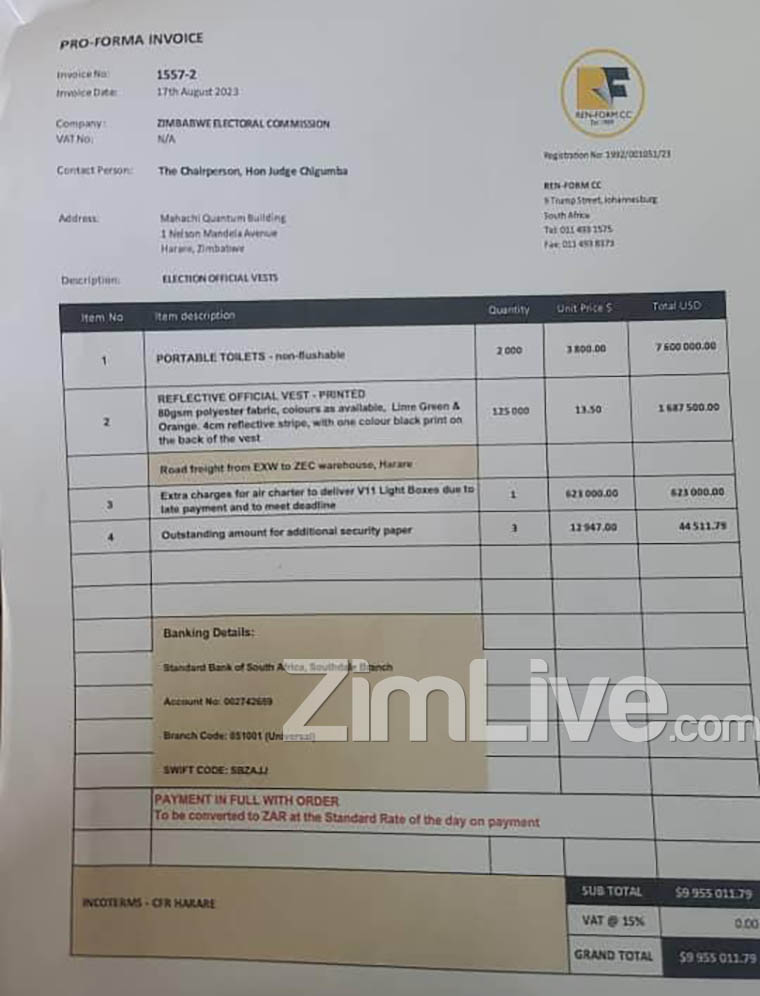HARARE – The Zimbabwe Electoral Commission (ZEC) splurged US$5 million on gadgets to display digital V11 polling station forms for last August’s elections – but the devices, bought at inflated prices, were only delivered months after the polls, ZimLive can reveal.
The transaction is one of many totaling over US$100 million paid to South African company, Ren-Form CC, which are being reviewed by the Zimbabwe Anti-Corruption Commission (ZACC) for possible corruption.
Ren-Form CC was given the contracts without going to tender in an opaque partnership with Zimbabwean businessman Wicknell Chivayo, who allegedly paid bribes to senior government officials for the contracts, according to his feuding former partners. In turn, Ren-Form CC agreed to inflate its invoices sometimes by over 1,000 percent. A large chuck of the markup, thought to be in the tens of millions of dollars, was then paid as “commission” to Chivayo.
Documents uncovered by ZimLive show that on May 8, 2023, about three weeks before President Emmerson Mnangagwa set the election date as August 23, Ren-Form CC generated an invoice for US$4,786,800 for what it described as “Voter Results Transmission Devices.” Each device was priced at US$319.12.
The invoice bearing number 1444 was curiously issued to the Office of the President and Cabinet, and listed the contact person as the Deputy Chief Secretary Human Resources, Finance and Administration, an office held by Zvinechimwe Churu. ZEC, as an independent commission with its own budget, is expected to conduct its own procurement.
Zimbabwe’s treasury part paid the invoice on July 31 into Ren-Form CC’s Standard Bank account in South Africa, according to proof of payment seen by ZimLive. An amount of US$4,126,500 was transferred, leaving a difference of US$660,300.
But just six days before the election, on August 17, we have seen evidence that the devices had still not been delivered. Ren-Form CC raised a new invoice now directed to the Zimbabwe Electoral Commission for US$9,955,011.79. Invoice 1557-2, listing ZEC chairperson Justice Priscilla Chigumba as the contact person, was for 2,000 non-flushable portable toilets priced at an astronomical US$3,800 each, 125,000 reflective vests at US$13.50 each and US$44,511.79 described as “outstanding amount for additional security paper.”
Another entry on the invoice was for “extra charges for air charter to deliver V11 Light Boxes due to late payment and to meet deadlines.” The cost: US$623,000. This, added to the US$4,786,800 for the light boxes means ZEC spent US$5,409,800 on the gizmos.
The invoice remained unpaid, however, and ZEC could have cancelled the order after elections came and went. The finance ministry, on September 7, and two weeks after the election, still approved payment through the permanent secretary George Guvamatanga who ordered treasury’s bankers at CBZ to settle the invoice.
The light boxes together with the portable toilets were not delivered until April 2024 and are now gathering dust at ZEC’s warehouse, a source said.




So, what are light boxes, and how were they going to work on election day? Light boxes are lighted display panels, typically featuring a translucent surface illuminated from behind and are commonly used for advertising purposes, including by shops and restaurants which use them to display their menus.
Bright LED lights or bulbs illuminate images or graphics placed on one side of the box giving vivid day and night visuals.
The profit-chasing marketers at Ren-Form CC appear to have convinced ZEC that these gadgets, at an astonishing US$319.12 each, were necessary expenditure for free and fair elections. How they would work is not clear. Ren-Form, in the May 8, 2023, invoice described them as “voter results transmission devices” but through online searches ZimLive has not found a light box that can “transmit” results.
The August 17 invoice helpfully describes them as “V11 Light Boxes”. A V11 is a form filled out by presiding officers and signed by party agents at each of the 12,370 polling stations that ZEC set up in 2023 – the primary source document for election results in Zimbabwe. It appears the plan was to place these results in “light boxes” ensuring they are illuminated throughout the night after vote counting ended which would, on paper, probably be useful in rural areas where lighting is poor.

Chinese multinational technology company Alibaba advertises light boxes for as little as US$6 on bulk orders. Ren-Form could have inflated the price by over 5,000 percent, some of which money would have found its way back to Chivayo, whom the company described as their “agent” to The Sentry, the international investigative news organisation.
Ren-Form, Chivayo and ZEC deny wrongdoing. ZEC also maintains that its procurement processes were “above board.” ZACC says it is investigating and has invited Chivayo and his former business partners Mike Chimombe and Moses Mpofu for questioning, but only the latter two have presented themselves.

The post ZEC paid US$5.4 million for fancy V11 display boxes that it never used appeared first on Zimbabwe News Now.
